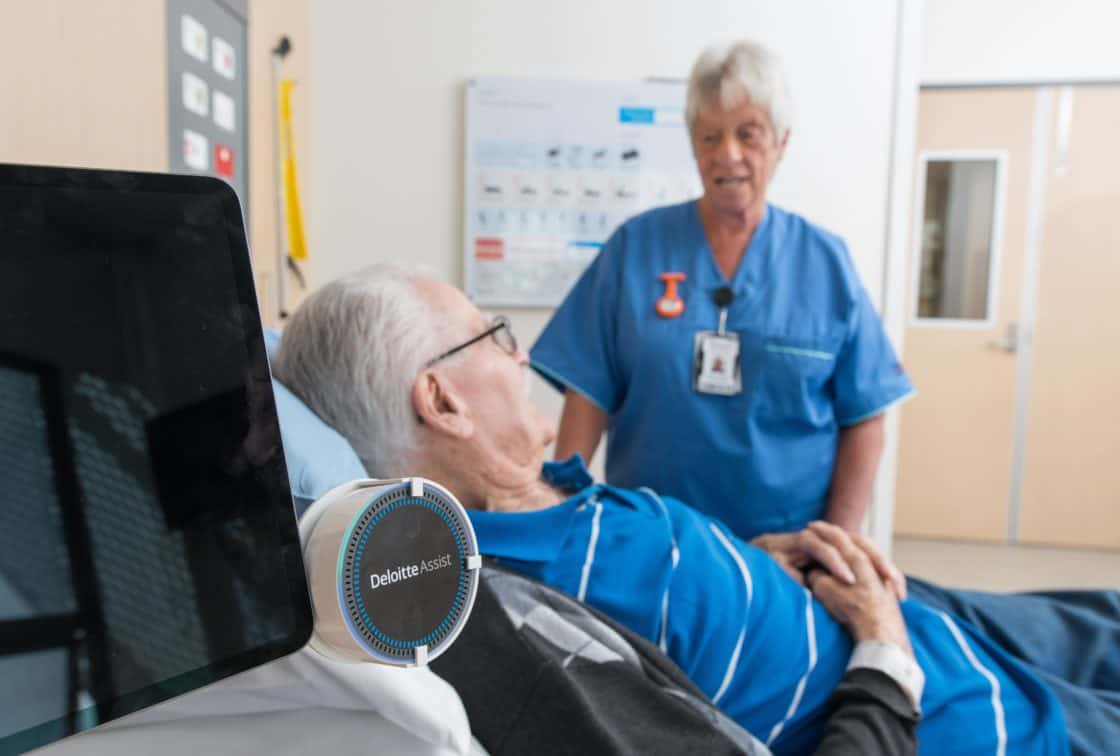Tuesday 5 February 2019Media release4 minutes to read
THIS IS AN ARCHIVED PAGE. The advice and information contained in this page may not be current and it should only be used for historical reference purposes.

A Burwood Hospital nurse, right, with orthopaedic rehab patient Neil Milne during testing of a new voice-activated patient call system.
From today some patients at Christchurch’s Burwood Hospital will be using smart speakers to assist with contacting a nurse. The new system will work in the same way as ‘smart speakers’ where you can ask for the weather forecast, to change the TV channel or to turn up the volume.
Canterbury DHB will become the first health authority in New Zealand and only the second in the world to use a voice-activated patient response tool when it pilots the DeloitteASSIST system across two wards at Burwood Hospital from today.
Designed to help patients communicate with their care teams, DeloitteASSIST is a solution to help make life easier for patients, says Burwood Hospital General Manager Dan Coward.
“We’re excited to be part of this pilot which uses technology to help patients get the support they need sooner. As the system recognises some specific set commands, nurses responding to a patient’s request will have a better idea of what the patient needs and come prepared, rather than responding to a call bell, then going off to get whatever may be required.
“Saving patients’ and staff time is an important way of enhancing the experience of our inpatients. At Burwood many of our patients are with us for months as they recover from serious injuries. I think they will enjoy the ability to request information, music and other entertainment from DeloitteASSIST by using simple voice commands.”
The device processes their voice command, automatically prioritising requests and sending the information to a tablet docked at the nurses’ station. The system uses the same platform that has transformed the delivery of Canterbury DHB’s HR services and better enabled orderlies across the DHB.
With DeloitteASSIST, patients can ask for assistance in using the bathroom, to ask the care team for help, or to request a glass of water and other simple requests. These requests are associated with priorities and escalation times determined by Burwood Hospital to help nurses and healthcare assistants focus care where it is most needed.
The smart speaker system understands multiple accents, and has some other functions like setting alarms for patients to remind them when to take their medication. It can give the weather forecast, play music, and even tell jokes on demand.
Beginning today in the Older Persons Health and Rehabilitation ward D1, DeloitteASSIST will also be used in the Burwood Spinal Unit and the Transitional Rehab Unit in the coming weeks. These wards have been chosen because patients here typically require more assistance due to mobility issues.
The People and Capability team at Canterbury DHB are focused on the future of work and improving the employee experience, says Acting Chief People Officer Paul Lamb. “This is another great example of working in partnership across the organisation in our commitment to making work, work better for our people so that they can focus on caring for our patients. We know that when work works better, care works better.”
DeloitteASSIST was first launched at the Prince of Wales Hospital in Sydney in April 2018, after Robert Spittle, a partner with leading professional services firm Deloitte, wanted to improve traditional nurse call buttons.
Spittle’s father had a fall while in hospital care – so he designed a system to improve the way care teams respond to patient requests.
Deloitte New Zealand partner Matt Dalton is running the project in New Zealand, and says the system is a great example of technology improving workflow, and making a positive impact on the lives of patients and staff.
“In New Zealand, and Canterbury in particular, we are seeing increased pressure on hospitals and healthcare professionals. DeloitteASSIST looks to change patient to nurse communication using advanced technologies including natural language processing and machine learning, which is the ability of a computer to understand and analyse language and improve its knowledge over time. Our aim is to improve the patient experience and make work easier for the nurses and healthcare assistants who look after them.”
Currently DeloitteASSIST can respond to 17 different categories of commands, and patients will still have their nurse call buttons available, too.
ENDS
Tags Burwood HospitalDeloitte ASSISTTechnology
Back to Health News

